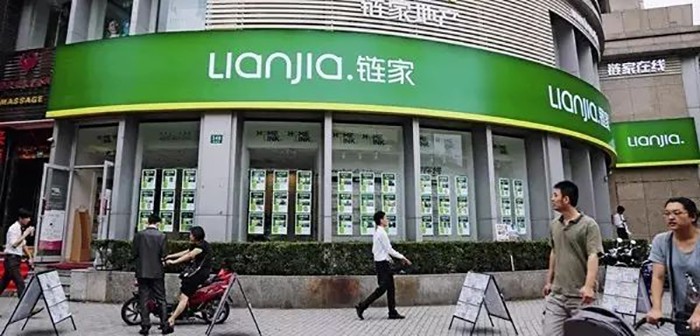
Beike was spun off from Beijing’s Lianjia brokerage in 2018
Softbank- and Tencent-backed housing broker Beike has lashed out against accusations of “systemic fraud” levelled by Muddy Waters Research, a US investment firm famous for exposing fraud at since-bankrupt Chinese firms Luckin Coffee, Sino-Forest and NQ Mobile while shorting their stocks.
A Muddy Waters investigation turned up “massive discrepancies” in the numbers reported in Beike’s financial statements, including a 126 percent inflation of the number of new home sales handled through its platform, which form the primary basis for the company’s revenues. Muddy Waters, which has made a speciality of exposing fraud at foreign-listed mainland firms, is short-selling Beike’s American depositary shares.
Beijing-based Beike, which trades on the NYSE under the name KE Holdings, issued a press release Friday portraying the Muddy Waters report as without merit and riddled with factual errors, unsubstantiated statements and misleading speculations and interpretations.
“The report also shows a lack of basic understanding of the housing transactions industry in China,” Beike said of the short-seller document, which also indicated that Beike had inflated its revenues by as much as 96 percent.
Ghosts in the Machine
Beike during the second and third quarter reported that its GTV from new home sales on its platform, which form the largest basis for its revenue, was RMB 908 billion. Based on sales figures collected and the average sales price reported by Beike, Muddy Waters estimated the GTV at just RMB 402 million, indicating an overstatement of 126 percent.

Muddy Waters founder Carson Block
With the company having reported combined revenues of 42.3 billion from 1 April through 30 September, the research firm concluded that those figures were overstated by 77 to 96 percent.
Muddy Waters gathered its data in part by sending field operatives to survey Beike’s storefronts and uncovering non-existent “ghost stores” that appeared on the company’s website and “clone stores” that appeared as multiple shops at a single location. The short seller’s research indicated that Beike’s reported total store count at the end of June this year was inflated by at least 23 percent.
Based on information scraped from Beike’s website, Muddy Waters further estimated that Beike had overstated the gross transaction value of deals conducted through its platform by 51 percent, figuring that the the platform’s third-quarter GTV was RMB 521 billion, rather than the RMB 788 billion that the Beijing-based firm had declared to the stock exchange.
The short seller, which first gained fame in 2011 for its exposure of a $2.9 billion fraud at Canadian-listed Chinese forestry firm Sino-Forest, estimates that in the second and third quarters of this year Beike inflated its platform GTV by roughly 65 percent.
Straw-Man Acquisition
The report also cast doubt on Beike’s RMB 1.8 billion (now $280 million) acquisition of Zhonghuan Real Estate Agency in a two-part transaction supposedly completed in 2020. Muddy Waters cited data from analytics firm SAIC showing that Beike routed the transaction through a likely straw buyer controlled by a company proxy.
“Straw buyers controlled by management proxies are a common way in our experience to overstate asset purchase prices,” Muddy Waters said.
Muddy Waters, founded by US investor Carson Block, likened Beike to coffeehouse chain Luckin in that each is “a real business with significant amounts of fraud”.
Formerly NASDAQ-listed Luckin Coffee last year admitted to fabricating its 2019 sales after Muddy Waters exposed accounting fraud at the company, which had tried to challenge Starbucks in China by carving out a niche with pickup-only locations.
Methods Questioned
Firing back on Friday, Beike said Muddy Waters’ methodology to capture the number of transactions was wrong and the calculation of GTV and revenues was incomplete, partly because the analysis ignored other sources of revenues.
Beike noted that it offers transaction services for new homes not only through stores it directly owns and operates and through connected stores with which it does business, but also through a dedicated sales team and other channels — “additional sources of revenues that the Muddy Waters report does not appear to have taken into account”, according to the broker.
The company founded by the late Zuo Hui reaffirmed its GTV for new-home transactions of RMB 498 billion in the second quarter and RMB 410 billion in the third quarter. Revenues from those transactions totalled RMB 13.9 billion and RMB 11.3 billion in the respective periods, Beike said.
On store counts, Beike termed Muddy Waters’ data “defective and incomplete” and based on a mistaken assumption that the “Find Agent” function on the home page includes sales agents responsible solely for new-home sales. Beike contended that those agents are listed separately on a “New Home” subpage and that they can opt out of the search results page at their discretion.
“Other allegations, including those related to acquisitions, R&D expenses, are also unfounded because they rely on incomplete data, erroneous estimation methodologies, unsupported speculations, and a mistaken understanding of industry practice,” Beike said.
Sino-Forest, which sued Muddy Waters for defamation in 2012 after Muddy Waters had exposed its fraudulent practices a year earlier, was de-listed that same year, with the Ontario Securities Commission ruling in 2017 that the firm and its directors engaged in deceitful or dishonest conduct.
Sinking Shares
As Beike defends the value of its business, which listed on the NYSE in August 2020, investors had already begun heading for the exits more than a year ago, with the company’s shares having lost more than 71 percent of their value in the past 12 months.
Earlier this month, mainland developer Sunac China Holdings revealed that it had unloaded a further $530 million worth of Beike shares during the period from 29 October to 7 December, bringing its total sell-off to $1.084 billion since June.
In May, less than a week after Beike’s founder and chairman died unexpectedly, regulators opened an investigation into suspected anti-competitive practices by the company, alleging consumer exploitation, Reuters reported.
In September, Reuters said Beike was planning a Hong Kong listing and had gone so far as to hire Goldman Sachs to lead a float, but the company denied having an “imminent plan” for an HKEX listing or any share sale.
Leave a Reply